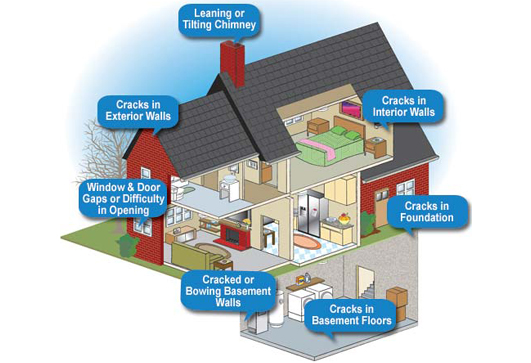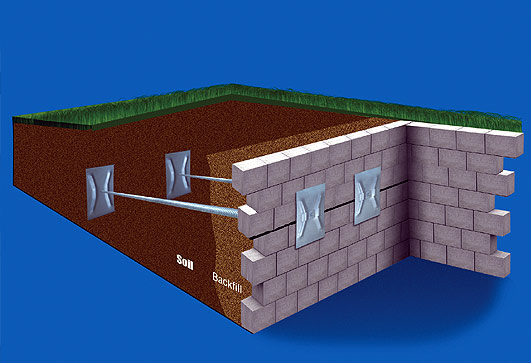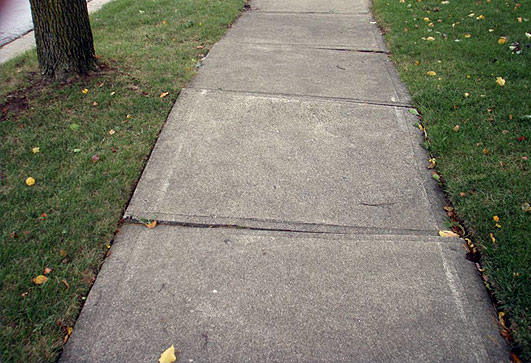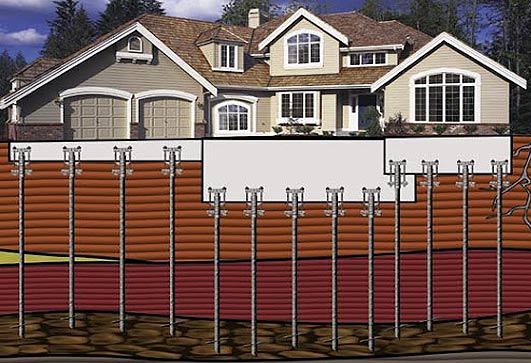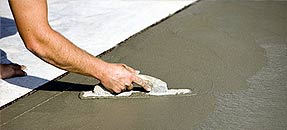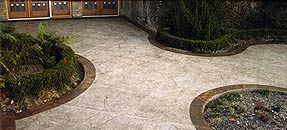Evaporation
Hot and dry conditions cause soil to pull away from your foundation. Settlement due to this foundation moisture imbalance could cause cracks to appear throughout your home.
Transpiration
Tree roots dehydrate the soil beneath a home causing soil shrinkage and differential settlement of your home.
Plumbing Leaks
Water from leaky plumbing is often a major contributor to foundation problems especially in slab on grade construction.
Drainage
Improper drainage or waterproofing can lead to excess moisture build up, which could erode or consolidate soils. Excessive moisture may cause expansive soils to swell and heave.
Poor Building Site Preparation
Cut and fill situations, where soil is removed from part of the lot and stacked on another, must be compacted properly before your home is constructed; otherwise unexpected movements of the soil beneath the foundation may occur.
Poor Ground Preparation
Improperly graded home sites often lead to future foundation issues. Grading should always divert water away from your home as to not allow water to seep under the foundation.
Poor Soil Conditions
Poor soil, organic components, debris, etc., may cause consolidation, which contribute
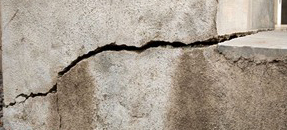 Inside of House
Inside of House• Cracks in drywall or ceilings
• Sticking windows and doors
• Cracks in concrete floors
• Gaps around door and windows
• Misaligned doors and windows
• Sloped floors
Outside of House
• Gaps around doors and windows
• Cracks in foundation
• Stair step racks in brick mortar
• Failed waterproofing
• Chimneys are tilting or leaning
• Water ponding around the foundation
• Soil separation around the foundation Garage
• Separation cracks between the floor and walls
• Walls rotating outward
• Slopping floors Basement
• Walls leaning in or out
• Bowed walls
• Cracks in the poured or block walls
• Water leakage through cracks at base of walls
• Cracked floors
• Waterproofing
• Water stains on floors and walls
Crawl Space
• Cracks in the foundation
• Bowing walls
• Tilting or leaning walls
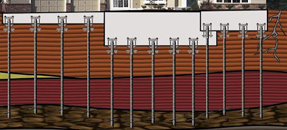
Steel push piers
Steel push piers are the best choice for homes that need to be lifted when doing foundation repairs. These push piers are driven to rock or load bearing soils and then can lift a home back to its original state. Drywall cracks can be closed, windows and doors can once again be opened and shut and exterior brick cracks will go away. The function of steel piers is to support and stabilize your homes load bearing walls as a permanent solution.
Helical Piers
Helical anchor piers is a staple product in the foundation repair industry. These screw piers are best used on slab foundations, porches and other light weight structures. Today, helical piers are one of the two most common types of structural piering devices for residential foundation applications in use today. Helical piers can be used to lift homes or stabilize foundations when driven deeply to stable soils.
Porch Pier
• Designed for light structures or overhangs
• Used for porches & wing walls
• Uses helical pier for support
• Small design can be easily hidden
Basement Tieback Anchor
Designed to stabilize and strengthen bowed basement walls. These helical anchors are a permanent solution to supporting basement walls that are cracked, bowed or leaning. These helical anchors are generally installed from inside the basement through a small hole that is sealed and repaired after installation. With exterior excavation, basement or crawl space walls can be immediately pulled back to original design levels.
Retaining Wall Tiebacks
Helical tieback anchors are installed to support new retaining walls or to strengthen bowed walls. Helical tieback anchors size and load requirements are engineered specific. With high load capacities these anchors make an excellent choice for critical soil retention applications.
Plate Anchors
Plate Anchors are the most economical method for providing support to cracked or bowed basement walls. Their simple and effective design allows foundation repair installers to complete jobs quickly and economically. Minimal disturbance to landscaping is one of the many benefits of plate anchors.
Hydraulic Lift Slab Pier
• Hydraulic lifting of concrete slabs
• Used for commercial and residental
• Mechanical version also available
• Unobtrusive means of slab support
• Handheld equipment can be used for installations to foundation failures.

